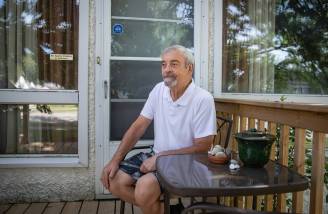Clawed-back funds belong to the children
Read this article for free:
or
Already have an account? Log in here »
To continue reading, please subscribe:
Monthly Digital Subscription
$0 for the first 4 weeks*
- Enjoy unlimited reading on winnipegfreepress.com
- Read the E-Edition, our digital replica newspaper
- Access News Break, our award-winning app
- Play interactive puzzles
*No charge for 4 weeks then price increases to the regular rate of $19.00 plus GST every four weeks. Offer available to new and qualified returning subscribers only. Cancel any time.
Monthly Digital Subscription
$4.75/week*
- Enjoy unlimited reading on winnipegfreepress.com
- Read the E-Edition, our digital replica newspaper
- Access News Break, our award-winning app
- Play interactive puzzles
*Billed as $19 plus GST every four weeks. Cancel any time.
To continue reading, please subscribe:
Add Free Press access to your Brandon Sun subscription for only an additional
$1 for the first 4 weeks*
*Your next subscription payment will increase by $1.00 and you will be charged $16.99 plus GST for four weeks. After four weeks, your payment will increase to $23.99 plus GST every four weeks.
Read unlimited articles for free today:
or
Already have an account? Log in here »
Hey there, time traveller!
This article was published 11/08/2022 (1221 days ago), so information in it may no longer be current.
The Manitoba government should be applauded for not appealing a court decision that concluded the province improperly clawed back an estimated $300 million in Children’s Special Allowance payments intended to support children in care.
But not appealing a decision that is so just and was so long in the making is only half the job. Manitoba must now take the money it wrongly clawed back from child welfare agencies and do something that improves the lives of children in care.
• Manitoba decides not to appeal court ruling on child benefit payments
To date, Families Minister Rochelle Squires has only acknowledged that “amends need to be made,” without explaining what the province is prepared to do. The provincial government must do better.
The practice of clawing back the CSA started under the NDP government in 2006. Ottawa designed the program to help child welfare agencies pay for cultural and recreational opportunities such as music lessons, summer camp and organized sports — opportunities children in care might not otherwise receive.
The province initially argued that because it funded the child welfare system, it was entitled to keep the allowance. Indigenous groups and child welfare agencies decried the practice and noted Manitoba was making very little effort to provide the opportunities the CSA was designed to fund.
The Progressive Conservative government inherited this NDP tactic in 2016 and continued it until 2019. However, the Tories did little to reconcile the clawback, and instead introduced a provision in the 2020 budget implementation bill that would convert the clawback policy retroactively into law to nullify any future legal action to retrieve the money.
MIKAELA MACKENZIE / WINNIPEG FREE PRESS Minister of Families Rochelle Squires
That strategy backfired in spectacular fashion; the cynical attempt to extinguish legal challenges prompted the Assembly of Manitoba Chiefs to immediately file a constitutional challenge.
In May, Court of Queen’s Bench Justice James Edmond determined the clawback was wrong and struck down the Tory government efforts to extinguish legal challenges. That left the province to decide whether to appeal. For the sake of all involved, no appeal will be filed.
But what to do with the roughly $300 million that was clawed back? Ms. Squires has struck a working group to examine and inform future policies and legislation related to Indigenous children in care. And she has said returning the money in some form, and the amount that needs to be returned, will be up for discussion within that group.
Given the PC government has had three months to deliberate on the appeal and the ramifications of the verdict, Ms. Squires needs to do better than promising consultation with a working group. She and her government have had enough time to make a more formal, more determined commitment to getting the money back into the child welfare system.
This PC government has too often used consultation processes as a stand-in for action.
This PC government has too often used consultation processes as a stand-in for action. Speeches from the throne and budgets are rife with references to intentions, processes and the need to reach out and get feedback from affected communities. What is regularly missing, however, is a definitive action plan.
Ms. Squires should expedite the consultation and announce a date by which some sort of consensus settlement will be reached. If consensus proves difficult for the working group, she should task an independent and informed third party mediator to listen to all involved and — once again, working to deadline — deliver a proposed solution.
It’s unlikely anyone following this story closely would describe the government’s intentions in this matter, to date, as honourable. And, no doubt, all are fully aware it took a court decision to force the Tories to consider a different approach.
No pledge of amends will cut suffice time. What’s required is action.







